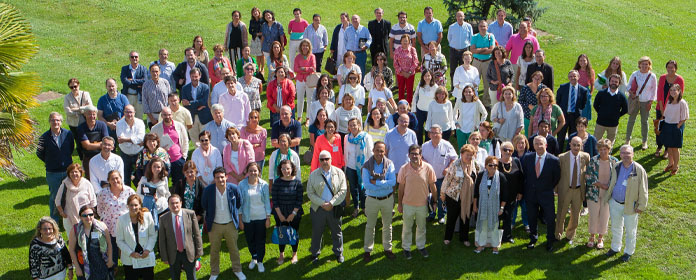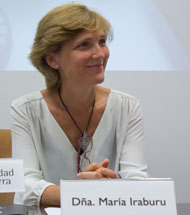María Iraburu: "The promises of transhumanism forget that there are limits, risks and failures in the fusion between biology and technology".
The Vice President of faculty of the University of Navarra closes the XIV ISCR update Course in which a hundred people participated

"The promises of transhumanism forget that there are limits, risks and failures in the fusion between biology and technology". This was stated by the Vice President of faculty, María Iraburu, during the closing ceremony of the XIV update Course of the Higher Institute of Religious Sciences of the University of Navarra (ISCR), focused on 'Current theological and pedagogical issues'.
 'Science, faith and transhumanism' was the degree scroll of the session of María Iraburu. D. in Biology and professor of Biochemistry and Molecular Biology, put the students in context and answered some questions about transhumanism, such as why it arises, what objectives it pursues and who are the transhumanists. He explained that "transhumanism promises, even with religious language, happiness through a human life transformed by technology" and that "in many transhumanist proposals biology is seen as defective and limited in the face of technology, forgetting that something as elementary as the healing of a wound cannot be done by a machine". The ethical and social risks of Transhumanism were also addressed: "technology is ultimately written request a form of power and control and must be used with caution so that it is at the service of man and not against him," concluded the speaker.
'Science, faith and transhumanism' was the degree scroll of the session of María Iraburu. D. in Biology and professor of Biochemistry and Molecular Biology, put the students in context and answered some questions about transhumanism, such as why it arises, what objectives it pursues and who are the transhumanists. He explained that "transhumanism promises, even with religious language, happiness through a human life transformed by technology" and that "in many transhumanist proposals biology is seen as defective and limited in the face of technology, forgetting that something as elementary as the healing of a wound cannot be done by a machine". The ethical and social risks of Transhumanism were also addressed: "technology is ultimately written request a form of power and control and must be used with caution so that it is at the service of man and not against him," concluded the speaker.
The course, held from August 28 to 30, was attended by a hundred people from 14 autonomous communities. The profile of the attendees was very varied: teachers, pharmacists, researchers, civil servants, businessmen, lawyers, veterinarians, priests, engineers, retired people and housewives.
30 sessions of training over three days. conference
Cristina López del Burgo, professor of the School of Medicine of the University of Navarra, was in charge of opening the sessions on Monday 28, with a discussion paper on 'Adolescents and the Internet'. Professor Inés Olza, a researcher at the Institute for Culture and Society (ICS), gave the next talk, which dealt with 'Ordering experience through language: narratives, emotions and identity'. position The last session of the morning was given by Jordi Puig, professor of the School of Sciences, with the discussion paper focused on 'An environmentalist meets Laudato si'.
In the afternoon, 12 sessions on Biblical Theology, Systematic Theology, Moral Theology and Pedagogy of Faith were offered for students to choose from.
The conferences on Tuesday, August 29, began with Juan Fernando Sellés, professor at School of Philosophy y Letras, and Francisco Moya, radiologist, who spoke in two sessions on 'Anthropology of the person. The meaning of life'. At 12.15 noon, Ruben Herce, professor of the School of Ecclesiastics of Philosophy, offered a session on 'The origin of man in the light of science'. In the afternoon, as on the previous workshop , 9 simultaneous sessions on Biblical Theology, Systematic Theology and Moral Theology were given.
José Mª Barrio, professor at the School of Education of the Complutense University of Madrid, gave the first lecture on Wednesday, August 30, under the title degree scroll 'The Christian educator in the face of the cultural challenge'. Next, Javier Otaduy, professor of the School of Canon Law, addressed 'The Apostolic Exhortation Amoris laetitia of Pope Francis'. Finally, at 12.15 noon, María Iraburu closed the course, with the presence of José Manuel Fidalgo, director of the ISCR and César Izquierdo, Associate Dean of the School of Theology.
